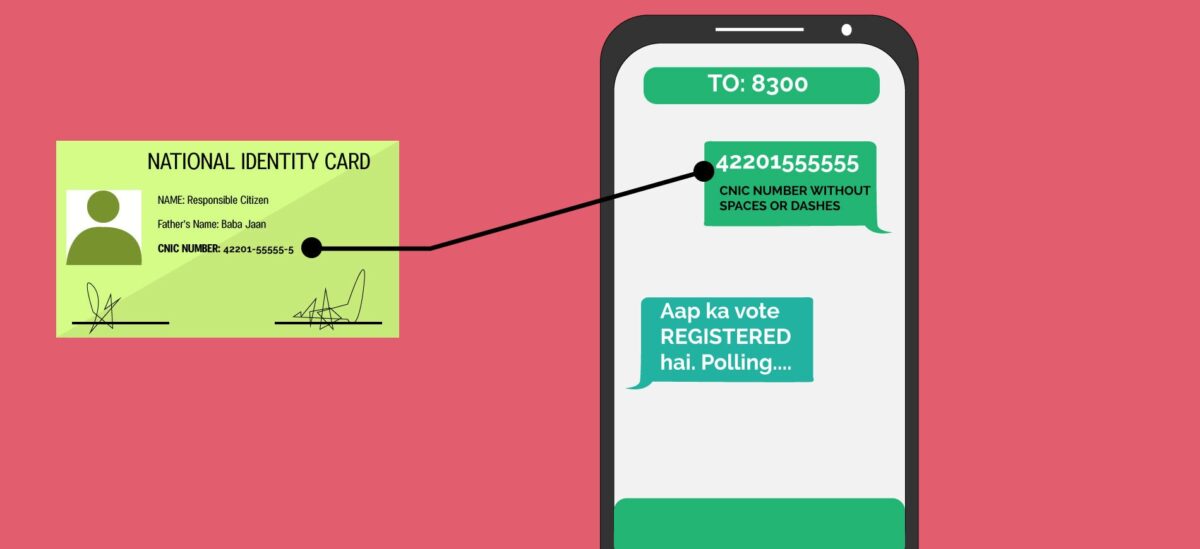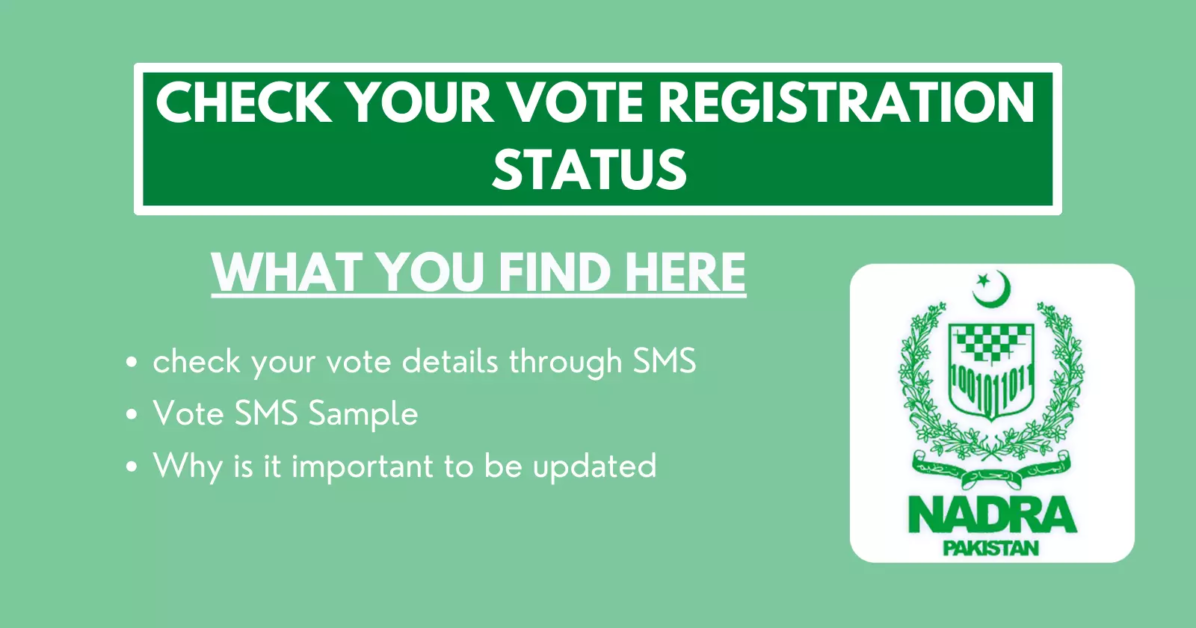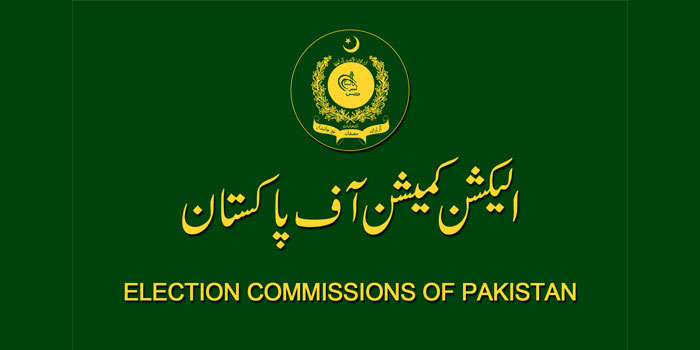As voting season approaches, individuals are encountering challenges in determining how to check their voting status in countries such as Pakistan, India, USA, UK, New Zealand, and others.
The process of verifying one’s voter registration can be crucial, ensuring that individuals are prepared to take part in upcoming elections. Do you possess the knowledge of how to check your registered vote?
We have outlined the following steps to guide you through the process of verifying your voting status and offering assistance in addressing any concerns you may have about your voter registration.
Familiarizing yourself with these steps will empower you to actively engage in the democratic process and exercise your right to vote in a well-informed manner. Let’s look at how to check vote in Pakistan.
How to Check Vote
To check your voting status or confirm your registration, you can follow the steps below:
1. Quick Check via SMS:
- Type your CNIC number (without hyphens or spaces) on your mobile phone.
- Send the text message to 8300.
- You’ll receive an automated reply with your electoral area, block code, and serial number if registered.

2. Verify Details in Person:
- Visit your District Election Commissioner’s (DEC) office.
- The final electoral roll with registered voter details is available there.
- Find your DEC office address or contact information on the Election Commission of Pakistan website: https://www.ecp.gov.pk/
غیرحتمی انتخابی فہرست 2022
4xxxx-xxxxxxx-8
شماریاتی بلاک کوڈ: 487503562
سلسلہ نمبر: 564
گھرانہ نمبر: 984
انتخابی علاقہ: رائیونڈ،تحصیل رائیونڈ،ضلع لاہور
ویب سائٹ: ecp.gov.pk/erolls
Addresses of the REC’s / DEC’s Offices
- TELEPHONE NUMBERS OF RECs / DECs IN KP PROVINCE
- TELEPHONE NUMBERS OF RECs / DECs IN PUNJAB PROVINCE
- TELEPHONE NUMBERS OF RECs / DECs IN Sindh PROVINCE
- TELEPHONE NUMBERS OF RECs / DECs IN Balochistan PROVINCE
Remember: the green ballot paper is for the National Assembly, and the white one is for your provincial assembly. This information is for Pakistani people.

precautions for voting
Before Voting:
- Register to vote: Make sure you’re registered to vote well in advance of the election deadline. Different countries and regions have different registration deadlines, so research yours early.
- Learn about the candidates and issues: Do your research and understand the platforms of the candidates and the ballot measures involved. Informed voting is crucial!
- Plan your trip to the polls: If voting in person, know where your polling station is, its opening and closing hours, and transportation options. Consider peak times and potential lines.
- Prepare necessary documents: Depending on your location, you might need ID or other documents to vote. Check requirements beforehand and have them ready.
- Be aware of disinformation: Pay attention to reliable sources for information and be wary of fake news or misleading claims about candidates or voting procedures.
During Voting:
- Follow polling place instructions: Be respectful of poll workers and other voters. Obey any safety measures in place, such as social distancing or mask requirements.
- Vote your conscience: Choose the candidates and measures that best align with your values and beliefs. Don’t feel pressured to vote a certain way.
- Maintain confidentiality: Don’t reveal who you voted for or take photos of your ballot, as this might be illegal or disruptive.
- Report any suspicious activity: If you see something concerning, like voter intimidation or fraud, report it to a poll worker or election official immediately.
is Pakistan a democratic country?
Describing Pakistan as a “democratic country” is complex and requires considering diverse factors. While Pakistan holds regular elections and has a multi-party system, various challenges raise questions about its democracy’s strength and functionality. Here’s a balanced perspective:
Arguments for Pakistan being a democracy:
- Elections: Pakistan conducts regular multi-party elections, with several parties competing and transferring power peacefully.
- Constitution: The country has a democratic constitution guaranteeing fundamental rights and liberties.
- Judiciary: An independent judiciary exists, playing a crucial role in upholding the rule of law.
Challenges to Pakistan’s democracy:
- Military influence: The military has historically held the most significant power and intervened in politics through coups and indirect influence. These days military and ISI significantly influence the election that will be held on 8 Feb.
- Weak civilian institutions: Political parties and parliament often lack strength and stability, hindering effective governance.
- Corruption: Widespread corruption undermines public trust in democratic institutions and processes.
- Restrictions on media and civil society: Freedom of expression and assembly face limitations, impacting open political discourse.
- Social and economic inequalities: Unequal access to education, healthcare, and economic opportunities create barriers to full political participation.
Therefore:
- Pakistan possesses several characteristics of a democracy, like elections and a constitution.
- However, significant challenges, like military influence and weak institutions, raise concerns about the quality and functioning of its democracy.
Ultimately, classifying Pakistan definitively as a “democracy” depends on your interpretation and the weight you give to different factors. Analyzing various viewpoints and ongoing developments is crucial for understanding the nuances of Pakistan’s political landscape.
FAQs
Which is the largest political party in Pakistan 2023 and 2024?
Due to 2023 election complexities, “largest” depends on your definition:
Historically: Pakistan Tehreek-e-Insaf (PTI) won the 2018 election.
Currently: PTI didn’t hold seats in 2023, but Pakistan Muslim League-Nawaz (PML-N) forms the government.
Technically: No party holds the “largest” title definitively in 2023.
Which party is strong in Pakistan?
Gauging a party’s strength depends on your perspective. PTI might hold a larger popular base, while PML-N enjoys current political power. The short answer is establishment (Army and ISI) is the strong party in Pakistan.
What has happened to Imran Khan?
As of today, February 1, 2024, Imran Khan’s situation is quite complex:
Legal:
- He has been sentenced to 10 years in prison in a case related to leaking classified information, known as the “cipher case.”
- He was also sentenced to 3 years in prison for illegally selling state gifts, but the court suspended this sentence.
- He is currently out on bail for both cases while appeals are ongoing.
How to check voter list online in Pakistan
Unfortunately, there isn’t an official online portal to check the voter list in Pakistan. However, you have two key options to verify your registration status:
1. SMS service:
- This is the quickest and easiest method.
- Type your CNIC number (without hyphens or spaces) on your mobile phone.
- Send the text message to 8300.
- You’ll receive an automated reply with your electoral area, block code, and serial number if registered.
2. Visit your District Election Commissioner’s (DEC) office:
- This method allows you to access the final electoral roll, which contains detailed information about registered voters.
- Find the address of your local DEC office by:
- Visiting the Election Commission of Pakistan (ECP) website: https://www.ecp.gov.pk
- Clicking on “Contact Us”
- Selecting “Addresses of the REC’s / DEC’s Offices”
- Downloading the relevant PDF for your province (KP, Punjab, Sindh, or Balochistan)
- Bring your CNIC document for verification.
How to check my vote number in Pakistan?
In Pakistan, there isn’t a specific “vote number” assigned to individual voters. However, you can verify your voter registration and obtain details like your electoral area, block code, and serial number using the two methods we have discussed above.

